
HIKING ETIQUETTE
The Rules You Need To Follow
Most of us know the rules of etiquette in everyday life that help society maintain a respectful and happy balance but the great outdoors is a whole new playing field with a new set of rules. Knowing what they are helps us blend in with our surroundings and contribute to that blissful, harmonious vibe so many of us seek when we head out.
Keep the noise down
The gentle rush of a river, the sound of the wind in the trees, birds singing - these are the kind of sounds we love when we go into the wilds. Less cool is hearing someone else’s music pumping out of speaker (on the trail or in camp) or loud hooting and hollering. Remember that sound travels when there aren’t any walls (nylon ones don’t count). As soon as fellow campers start drifting off to bed, it’s good to turn down the volume to whisper-level. If you’re getting up early, don’t assume everyone else is getting up early too. Talk in whispers, keep noise to a minimum and keep torch light well away from sleeping faces. You can minimise early rustling by getting prepared as far as possible, the night before.
Personal Space
There are no walls in the great outdoors but sometimes it’s helpful to imagine a few boundaries. Some people like a chat while others are out there to avoid humanity and commune with nature. Try to ascertain which they are before launching into a Q & A or shadowing other hikers on the trail. This respect of personal space applies at camp too. It’s fairly intuitive but, just to be clear, don’t put your tent up within arm’s reach of another. Leave plenty of space to allow for as much visual/sound privacy as is possible.
On the trail
If you’re looking to overtake someone on singletrack, offer a friendly greeting and ask if you can pass; try not to be so quiet that you inadvertently sneak up and surprise them. It’s more important for someone walking uphill to stay in their flow so give way to any passing hikers who are mid-climb. Keep phones on silent; no one wants to hear the constant ping of alerts disturbing the peace. Be super considerate if you’re using a drone. Their noise can be as welcome as a horde of buzzing blowflies, plus many hikers feel they can be invasive of their privacy as well.
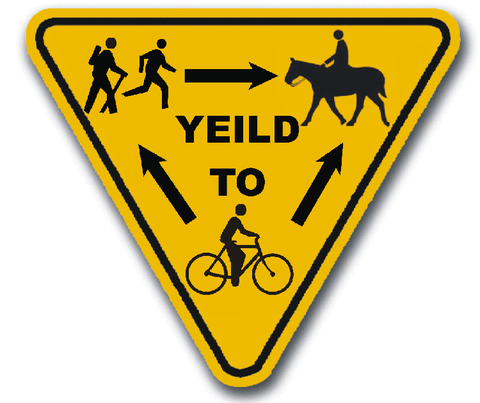
Respect the environment
Most of us walk into nature because we love it and if you love it, you’ll want to look after it. That means not leaving your mark. Leave the trees and rocks free from personal inscriptions, don’t break off branches or pick wildflowers, and do not make stone stacks which can greatly disturb animal habitat (even if you can’t see them). Give animals plenty of space as human encounters can be stressful for them or interfere with their natural flow (food-finding, offspring-nurturing, etc). Stick to the trail to avoid the spread of plant disease and erosion. This includes not creating shortcuts on zigzag trails and not walking around puddles which just increases their size or creates a mess of new trails.
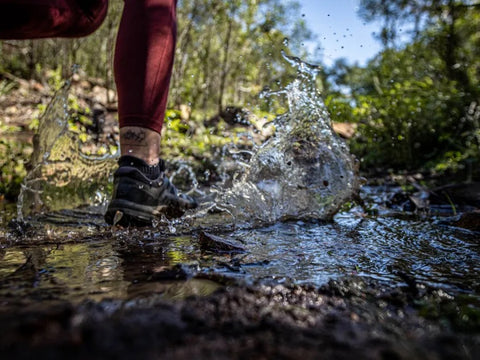
Sharing is caring
Camping areas often have limited space. Choose where you want to set up and then resist spreading your gear far and wide. If there are facilities such as picnic tables or chillout areas, they are likely to be limited so be prepared to share them. Don’t spread your gear out on tables for example and leave it there until breakfast the next day. Cook your meal and then pack up and move out so that others can enjoy a seat too. If there is a river in camp, avoid washing your socks upstream of where people are collecting water.
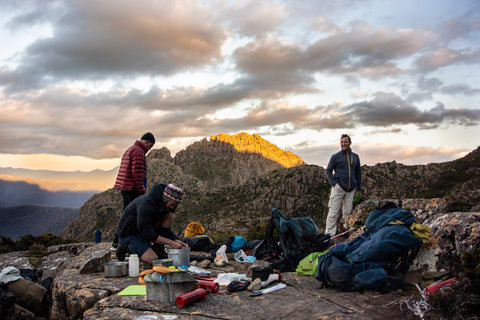
Leave no trace
We hear it all the time but it’s golden advice. Don’t leave empty tin cans, toilet paper or any other rubbish behind (including organic stuff like orange peel or eggshells) and don’t spit toothpaste out at water tanks (brush your teeth in the bush and then scuff some dirt over where you’ve been). When it comes to washing – whether it be sunscreen/sweat covered bodies or oily cooking pots - best practise is to carry a pot of water well away from the river or lake and do your washing there to avoid polluting the source.
It’s tempting to walk two paces from your tent at 2am and ‘water the plants’ - rather than stagger to a perhaps distant ‘official’ loo - but persistent attention from campers can leave campsites stinking like neglected public toilets. If you can’t face a darkened and possibly spider-infested cubicle in the middle of the night, at least walk a decent distance away and spread the love.
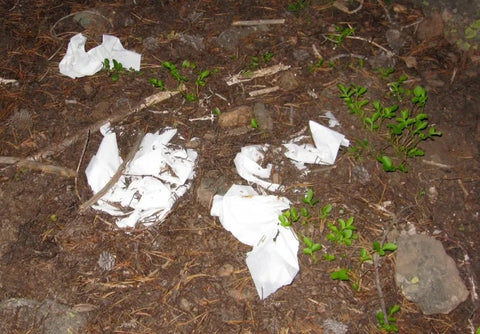
Keep it tidy – huts & shelters
Leave no trace applies indoors as well. In the relative comfort of a backcountry hut, it’s particularly easy forget that there are no cleaners on their way to tidy up after you leave so remember to wipe down the tables, sweep the floor (if there is a broom), and don’t leave left over bits of food or rubbish lying around that might attract vermin.
Treasure valuable resources
You might be really proud of the convenience offered by your nifty five-litre water bladder with tap or camp shower but resist loading it up to the max if your source is precious tank water. It’s a limited resource that hikers after you might be relying on to drink. The same goes for firewood. Crackling fires are great for atmosphere and visual entertainment but it’s best to preserve wood for when conditions are cold enough to warrant a fire. Be sparing with fuel and if it’s one of those situations where firewood has been collected by other walkers before you (perhaps in a hut), replenish stocks where possible so it's ready for the next cold and wet hiker who turns up.
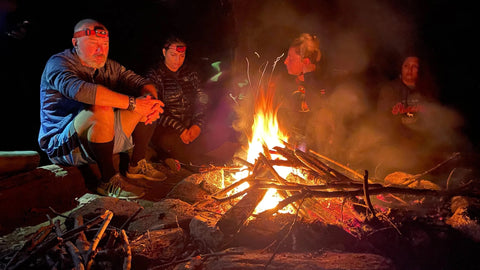
Good etiquette is simply about respect - of the land and everyone and everything on it. Enjoy.

Leave a comment